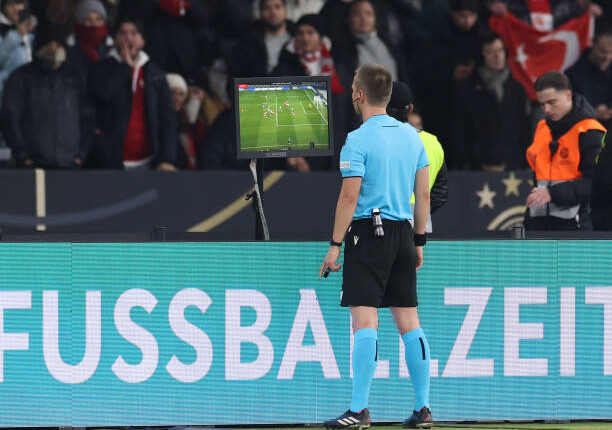
The negative effect of VAR in football
The heralded arrival of the Video Assistant Referee (VAR) was meant to usher in an era of impeccable accuracy and fairness in football, yet its presence on the pitch has sparked a maelstrom of discontent. This season, VAR’s inconsistency has triggered a wave of criticism, casting shadows over the very essence of the beautiful game.
The Video Assistant Referee (VAR) system, once hailed as the beacon of accuracy and fairness in football officiating, has encountered a barrage of criticism this season. Its lack of consistency has become a contentious issue, tarnishing the essence of the beautiful game.
One of the most palpable disruptions caused by VAR is the significant pause it imposes on the flow of a match. When a potential goal or penalty arises, the referee halts the game to review footage on a screen.
This process, at times, stretches for several minutes, leaving players idly standing, disrupting their rhythm, and potentially affecting their performance. The stop-start nature diminishes the excitement and spontaneity that football thrives upon.
Moreover, VAR’s promise to eradicate mistakes from the game remains unfulfilled. In recent matches, pivotal offside decisions in goals cost Arsenal and Brighton victories, while Chelsea was notably denied a penalty in a contentious London derby against West Ham. The Independent highlighted these incidents, emphasizing how such errors significantly impacted the outcomes of matches.
Referees’ chief, Howard Webb, reached out to acknowledge these “significant errors,” signaling a recognition of the system’s fallibility. Additionally, the BBC reported numerous incorrect interventions by Premier League video assistant referees, indicating a systemic issue undermining the credibility of the technology.
The dehumanization of football has also surfaced as a concern amidst the growing influence of VAR. Football’s allure lies in its unpredictability and the acceptance of human error—be it from players, coaches, or referees. Digital Mahbub eloquently noted that this unpredictability is a fundamental charm of the sport.
VAR’s intervention, however, strips away this element of unpredictability, detracting from the very essence of the human element within the game.
The artistry and the resilience to overcome human errors, a narrative that has long captivated football fans, are compromised in the pursuit of stringent technological intervention.
The repercussions of VAR’s disruption, mistakes, and dehumanization have rippled through the sport. From contentious offside calls altering match outcomes to the erosion of football’s unpredictability, the negative impact on the sport is undeniable.
Football, celebrated for its raw emotions and captivating narratives, finds itself at a crossroads where technological advancements clash with the inherent spirit of the game.
Amidst these challenges, it is imperative to recalibrate VAR’s role in football. While technology can enhance officiating, its current manifestation disrupts the fluidity of the game and diminishes its human essence.
A balanced approach that preserves the spontaneity while leveraging technology for accuracy is necessary. Clearer guidelines, meticulous oversight, and a redefined scope for VAR’s interventions could pave the way for a harmonious coexistence between tradition and innovation.
In conclusion, the controversies surrounding VAR’s disruption, its perpetuation of errors, and its tendency to dehumanize football underscore the need for introspection and reform.
Football’s integrity and allure rest upon a delicate balance, one that must be restored to safeguard the essence of the beautiful game we cherish.
This extended article explores the disruption, errors, and dehumanization caused by VAR in football, emphasizing the need for reform while acknowledging the desire for accurate officiating
Follow us on all social media platform, @Sportscliffs on Twitter and Instagram and also like our facebook page

